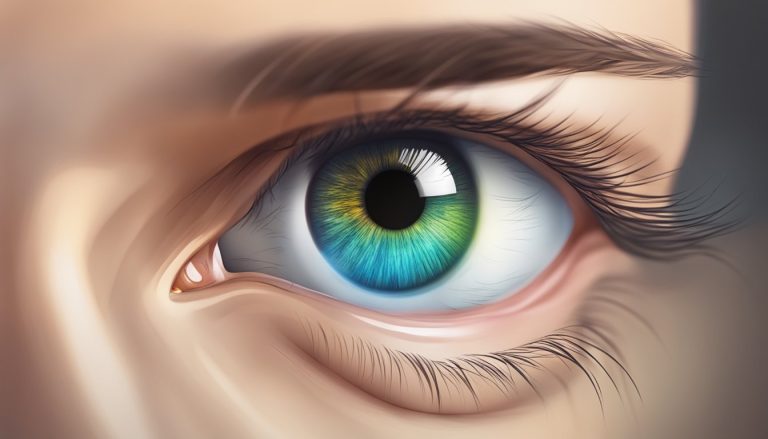Vitamins for Vision Loss: What You Need to Know
Vitamins for Vision Loss: What You Need to Know

If you’re experiencing vision loss, you may be wondering if there are any vitamins that can help improve your eyesight. The answer is yes, certain vitamins and supplements can help slow down or even reverse vision decline. However, it’s important to note that vitamins alone cannot cure serious eye conditions or diseases.
A healthy diet that includes a variety of nutrients, vitamins, and minerals is essential for maintaining good eye health. Antioxidants such as vitamins A, C, and E, as well as minerals like zinc and copper, play a crucial role in protecting your eyes from damage caused by free radicals. Additionally, omega-3 fatty acids found in fish and flaxseed can help prevent dry eye syndrome and macular degeneration.
Key Takeaways
- Certain vitamins and supplements can help slow down or even reverse vision decline.
- A healthy diet that includes a variety of nutrients, vitamins, and minerals is essential for maintaining good eye health.
- Antioxidants such as vitamins A, C, and E, as well as minerals like zinc and copper, play a crucial role in protecting your eyes from damage caused by free radicals.
Can Vitamins Reverse Vision Decline?
If you are experiencing vision loss, you may be wondering if vitamins can help reverse the decline. While vitamins cannot cure all types of eye disease, they can help slow the progression of certain conditions.
One of the most common causes of vision loss is age-related macular degeneration (AMD). Research has shown that certain vitamins and minerals, such as vitamin A, vitamin C, vitamin E, carotenoids, lutein, zeaxanthin, and omega-3 fatty acids, can help slow the progression of AMD.
Vitamin A is essential for vision and can help prevent night blindness and other eye diseases. Vitamin C is an antioxidant that can help protect the eyes from damage caused by free radicals. Vitamin E can also help protect the eyes from free radicals and may help reduce the risk of cataracts.
Carotenoids, such as lutein and zeaxanthin, are found in high concentrations in the retina and can help protect the eyes from damage caused by blue light. Omega-3 fatty acids are also important for eye health and may help reduce the risk of AMD.
While vitamins and minerals can help slow the progression of certain eye diseases, they cannot reverse the damage that has already been done. It is important to talk to your doctor about which vitamins and supplements are right for you and to follow their recommendations closely.
Overall, while vitamins cannot cure all types of eye disease, they can help slow the progression of certain conditions. Incorporating vitamins and minerals into your diet can help support eye health and may help reduce the risk of vision loss.
Best Vitamin Supplement for Eyesight Improvement
Taking vitamin supplements can play a vital role in maintaining eye health and improving vision. Let’s take a look at some of the best vitamin supplements for eyesight improvement.
Best Eye Vitamin for Macular Degeneration
Age-related macular degeneration (AMD) is a leading cause of vision loss in older adults. The Age-Related Eye Disease Study (AREDS) found that a specific combination of vitamins and minerals can reduce the risk of AMD progression. This combination, known as AREDS formula, includes vitamin C, vitamin E, zinc, copper, and beta-carotene.
Best Eye Vitamins for Blurry Vision
Blurry vision can be caused by a variety of factors, including nutrient deficiencies. Omega-3 fatty acids, found in fish and fish oil supplements, have been shown to improve eye function and decrease the risk of macular degeneration. Lutein and zeaxanthin, found in leafy green vegetables, are also beneficial for eye health and can help reduce blurry vision.
Supportive Eye Vitamins
In addition to the vitamins and minerals found in the AREDS formula, there are other nutrients and antioxidants that can support eye health and vision improvement. Vitamin C, found in fruits and vegetables, is a powerful antioxidant that can help protect the eyes from damage caused by free radicals. Vitamin E, found in nuts and seeds, can also help protect the eyes from oxidative stress.
Overall, a diet rich in fruits, vegetables, and omega-3 fatty acids can help maintain eye health and improve vision. While vitamin supplements can be beneficial, it’s important to speak with your healthcare provider before starting any new supplement regimen.
Can Vitamins Cause Eye Problems
While vitamins are essential for overall health, over-supplementation can lead to health problems, including eye problems. In this section, we will discuss the link between vitamins and eye health, and if taking too many vitamins can cause eye problems.
Can Too Many Vitamins Cause Blurred Vision
Taking too many vitamins, especially fat-soluble vitamins, can cause toxicity and lead to blurred vision. For example, excessive intake of vitamin A can cause blurred vision, headaches, and dizziness. Vitamin E supplements can also cause vision problems, including blurred vision and double vision.
Can Too Much Vitamin D Cause Blurred Vision
Excessive vitamin D intake can lead to toxicity and cause blurred vision. Vitamin D toxicity can cause a buildup of calcium in the blood, leading to hypercalcemia, which can cause blurred vision, weakness, and fatigue.
It is important to maintain a nutrient balance and not over-supplement with vitamins. Taking a multivitamin supplement that contains all the essential nutrients in the right amounts can help maintain eye health. However, it is essential to consult a healthcare professional before taking any supplements, especially if you have an eye disease or are at risk of developing one.
Free radicals and oxidative stress can also lead to eye problems, including vision loss. Consuming a diet rich in nutrients, such as vitamin C, vitamin E, and zinc, can help protect the eyes from free radicals and reduce the risk of eye problems.
Inflammation is also a leading cause of eye problems, including age-related macular degeneration (AMD). Consuming anti-inflammatory foods, such as leafy greens, fatty fish, and nuts, can help reduce inflammation and protect eye health.
In conclusion, while vitamins are essential for eye health, over-supplementation can lead to health problems, including eye problems. It is important to maintain a nutrient balance and consult a healthcare professional before taking any supplements.
Frequently Asked Questions
What are the most effective vitamins for improving blurry vision?
Vitamins A, C, and E are known to help improve blurry vision. Vitamin A is essential for maintaining good eyesight, while vitamins C and E have antioxidant properties that can help protect the eyes from damage caused by free radicals.
Which supplements are known to enhance overall eyesight?
Supplements that contain lutein and zeaxanthin are known to enhance overall eyesight. These two nutrients are found in high concentrations in the macula of the eye, and they help protect the retina from damage caused by blue light.
How can vitamins help in reducing the appearance of eye floaters?
Vitamins that contain antioxidants, such as vitamins C and E, can help reduce the appearance of eye floaters. These vitamins help protect the eyes from damage caused by free radicals, which can contribute to the formation of floaters.
What foods are rich in vitamins beneficial for eye health?
Foods that are rich in vitamins beneficial for eye health include leafy green vegetables, carrots, sweet potatoes, citrus fruits, and berries. These foods are high in vitamins A, C, and E, as well as other nutrients that are essential for maintaining good eyesight.
Which eye vitamins are recommended for preventing macular degeneration?
The Age-Related Eye Disease Study (AREDS) found that a specific combination of vitamins and minerals can help prevent macular degeneration. This combination includes vitamins C and E, beta-carotene, zinc, and copper.
Are there any specific vitamin deficiencies linked to vision loss?
Yes, there are several specific vitamin deficiencies that are linked to vision loss. These include vitamin A deficiency, which can cause night blindness, and vitamin B12 deficiency, which can cause optic neuropathy.




